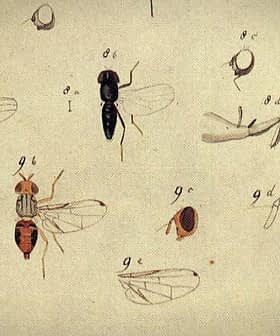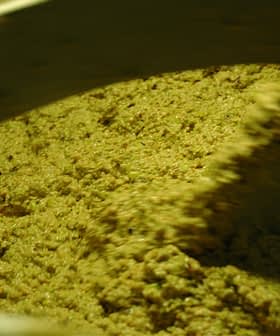Study: Oleocanthal Regulates Abnormalities in Receptor Responsible for Alzheimer’s
Researchers from the University of Louisiana-Monroe are working to create an oral oleocanthal-based supplement for Alzheimer’s patients.
Researchers at the University of Louisiana-Monroe are investigating oleocanthal-based treatments for Alzheimer’s disease, which has shown promise in treating certain types of cancers and dementia. The study focuses on the interaction between oleocanthal and the C3AR1 receptor, with the goal of developing new oral formulations to make oleocanthal a viable treatment option for Alzheimer’s disease.
The use of oleocanthal-based treatments for Alzheimer’s disease continues to emerge, with the latest findings from a team of researchers at the University of Louisiana-Monroe.
The polyphenol, which gives extra virgin olive oil its distinctive throat burning sensation, has already shown promise in treatments for certain types of cancers and dementia.
The oleocanthal modulation (regulation) of C3AR1 is a very important finding that will direct future studies of oleocanthal as a plausible nutraceutical for prevention and modulation of pre-Alzheimer’s disease neurodegenerative conditions.
Alzheimer’s disease, which is the most common form of dementia, leads to irreversible and progressive degeneration of the brain functions, including memory, personality, cognition and other vital functions.
In the United States, six million people live with Alzheimer’s disease. This figure is projected to rise to 13 million by 2050 according to the U.S. Alzheimer’s Association. An estimated 50 million people around the world live with Alzheimer’s disease.
See Also:Health NewsThe latest research, published in Nutrients, investigated the interaction between oleocanthal and the complementary peptide C3a receptor 1 (C3AR1), which is also involved in other types of neurodegenerative diseases.
“The complement system is an important element of the innate immune system, which enhances the antibodies and phagocytic cells to clear damaged cells and pathogenic microbes,” Khalid El Sayed, a pharmaceutical and toxicological sciences professor at the University of Louisiana-Monroe and co-author of the study, told Olive Oil Times.
C3AR1 is a regulatory hub in the innate immune system. In Alzheimer’s disease patients, the receptor overworks, promoting inflammation and impairing the function of the innate immune system.
The receptor behaves similarly in patients at risk of developing Alzheimer’s disease as well. The researchers said that the receptor’s deactivation leads to a decrease in tau pathology, which is a key element in the development of Alzheimer’s disease.
Therefore, “the oleocanthal modulation [regulation] of C3AR1 is a very important finding that will direct future studies of oleocanthal as a plausible nutraceutical for prevention and modulation of pre-Alzheimer’s disease neurodegenerative conditions,” El Sayed said.
The main focus of the research has been identifying new oral formulations which could soon make oleocanthal a viable treatment for the disease.
“Oleocanthal causes most of the irritative, bitter and pharyngeal taste of extra virgin olive oil,” El Sayed said. “It has a sort of highly reactive aldehyde groups, which cause high chemical and metabolic instability.”
“These are challenges that have to be addressed before using oleocanthal in human clinical trials,” he added. “We developed novel formulations that masked its undesired taste attitudes and maintained its chemical integrity.”
See Also:Mediterranean Diet May Prevent Memory Loss and Dementia SymptomsAccording to El Sayed, extra virgin olive oil consumption is believed to have a role in a lower incidence of cognitive diseases in Mediterranean nations, compared to other European and American populations.
“Oleocanthal has been reported to show promising activities against the markers of neurodegenerative insults that lead to cognitive diseases in vitro and in animal models,” he said.
“Greek extra virgin olive oil rich in phenolics [especially oleocanthal] have shown promising protective activity against early stages amyloid pathologies that lead to Alzheimer’s disease,” he added.
The research has been based on 5xFAD mice, a standard in Alzheimer’s research; the two new oral formulations found by the researchers have “maintained amyloid pathogenesis suppressive activity by reducing the β‑amyloid accumulation in the mouse brains,” the study reads.
The new formulations, explained the researchers, “significantly improved its pharmacodynamics effects and delivery in Alzheimer’s diseases animal models.”
In order for the two new supplements to reach the market, El Sayed said “oleocanthal has yet to be pre-clinically tested as a single entity in Alzheimer’s disease patients so that it can earn investigational new drug approval from the Food and Drug Administration.”
“We actually patented our new formulations and have plans to commercialize oleocanthal nutraceutical and dietary supplement using these formulations in the near future,” he added.
However, the research is ongoing with pre-clinical examinations planned.
“We need to understand more about the in vivo metabolic fate of oleocanthal and validate the short and long-term safety for its use, which are top priorities before clinical testing,” El Sayed concluded.









